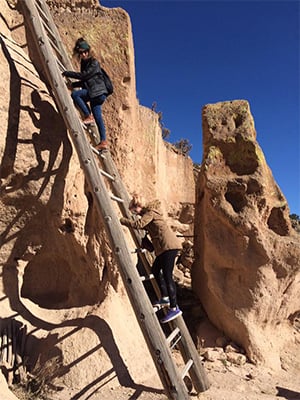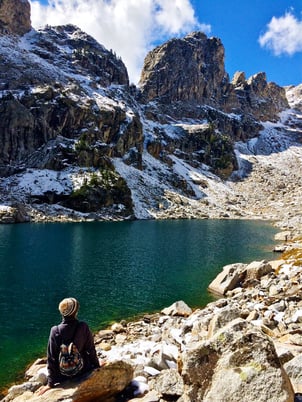As an AmeriCorps volunteer, Rachel Steinberg knew she wanted to work with Native American communities. Now, preparing to graduate with her MPH from the Colorado School of Public Health (ColoradoSPH), Steinberg is set to continue her mission of serving vulnerable populations.
During her AmeriCorps stint, Steinberg worked at two Indian Health Service clinics on the Wind River Reservation in Wyoming. “I met a lot of close-knit families with solid support systems,” she said of her year of service. “These are just people living normal lives.”
That is not to say problems didn’t exist, particularly in healthcare. She remembered seeing systemic problems for already vulnerable patients — long wait times, too few care providers and lack of cultural representation among providers. “I saw what it was like to have people serving your community who are not from your community.”
Seeing firsthand how many providers were not Native, Steinberg said it made her passionate about improving the workforce pipeline. “The goal is to get more Native people providing care to their own communities.”
Steinberg said she came out of the experience knowing she wanted to improve public health systems.

Pretty Eagle Point at Crow Reservation in Montana.
Mentors enhance MPH experience
For her MPH, Steinberg decided to concentrate in epidemiology to get the data skills she needed to tackle big public health problems.
She credits many mentors with playing pivotal roles in her success. Even before she was accepted into the MPH program at the ColoradoSPH, she cold-emailed Dana Dabelea, MD, PhD, director of the Lifecourse Epidemiology of Adiposity and Diabetes (LEAD) Center at the CU Anschutz Medical Campus, to set up an informational interview. “Back then, I didn’t know how big of a deal she was,” Steinberg said with a laugh.
Puye Cliff Dwellings on Santa Clara Pueblo.
After getting into the MPH program, Steinberg began working as a student assistant for the Tribal Turning Point (TTP) program, which aims to use culturally appropriate behavioral interventions to prevent type 2 diabetes in American Indian youth. TTP has two study sites within the Navajo Nation and also works with an urban Native community in Phoenix.
Work for Steinberg’s MPH capstone project was performed under the direction of Christy Hockett, PhD, who was the project manager for TTP. In the midst of Steinberg’s capstone work, Hockett transitioned to a new job, and Steinberg was offered the project manager position, which she’s held since January.
Working while trying to complete her studies wasn’t without costs. Steinberg noted MPH students in particular sometimes feel a sense of not quite fitting in on the CU Anschutz campus. “MPH students look at health from the population level, as opposed to the patient level,” Steinberg explained, which tends to set them apart from many peers on campus. “I appreciated having people in my program to support each other. That support is harder to get than people realize.”
Commute, intense schedule add challenges
Steinberg earned her MPH in only two years while also working multiple jobs, a timeline she calls “really challenging.” She added, “I can think of a lot of things that were hard, and I wish I had come up with a different way to do them.”
“For coronavirus, like so many public health issues, we’re experiencing the same storm, but we’re really not all in the same boat.”
Take housing, for example. Steinberg lives in Boulder and commuted to the CU Anschutz campus by bus for two years. “I feel like I should have moved,” she said, explaining she burned out “pretty hard” last semester. “I was taking a lot of hard classes and working a lot of hours. I got really tired,” she said.
“I do wonder what my life would be like if I had been more flexible with my timeframe. Maybe I could have slowed down and not tried to graduate in two years. I don’t think there’s anything wrong with taking your time.” Steinberg noted she loved the MPH experience, and yet: “I’m really tired. I’m looking forward to just working.”
Lake of the Crags at Grand Teton National Park.
Earning an MPH in the COVID-19 era
Asked about the novelty of earning an MPH during the COVID-19 pandemic, Steinberg was quick to note her work on preventing chronic diseases like diabetes might appear to be at the opposite end of the public health spectrum from tackling outbreaks of infectious diseases like COVID-19. But different though they may seem, many types of public health services are undoubtedly linked – diabetes and other chronic conditions are risk factors for COVID-19 complications.
Steinberg acknowledged the effects COVID-19 has had on her work, since she works with already vulnerable populations. Noting her TTP staff are located in high-risk areas for coronavirus outbreaks, she said, “I’m worried about them. I mailed them care packages recently – nothing special, just a card, a jar of homemade apple butter, some seeds to plant.”
As bad as COVID-19 has been in Colorado, Steinberg said it’s worse in rural areas of the country. “We have a lot of privileges in the Denver metro area. People in more rural areas may not have running water or transportation. How do you wash your hands if water is a limited resource? How do you see a doctor?”
Steinberg said she keeps hearing messages of unity around COVID-19, that we’re all in the same boat with this disease. But she says that’s not necessarily true. “For coronavirus, like so many public health issues, we’re experiencing the same storm, but we’re really not all in the same boat.”
Guest contributor: Shawna Matthews is a freelance writer specializing in science and healthcare.






